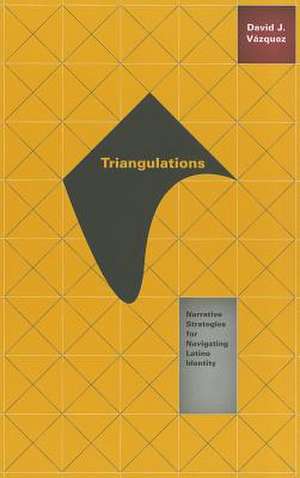Triangulations: Narrative Strategies for Navigating Latino Identity: Critical American Studies
Autor David J. Vázquezen Limba Engleză Paperback – sep 2011
Just as mariners use triangulation, mapping an imaginary triangle between two known positions and an unknown location, so, David J. Vázquez contends, Latino authors in late twentieth-century America employ the coordinates of familiar ideas of self to find their way to new, complex identities. Through this metaphor, Vázquez reveals how Latino autobiographical texts, written after the rise of cultural nationalism in the 1960s, challenge mainstream notions of individual identity and national belonging in the United States.
In a traditional autobiographical work, the protagonist frequently opts out of his or her community. In the works that Vázquez analyzes in Triangulations, protagonists instead opt in to collective groups—often for the express political purpose of redefining that collective. Reading texts by authors such as Ernesto Galarza, Jesús Colón, Piri Thomas, Oscar “Zeta” Acosta, Judith Ortiz Cofer, John Rechy, Julia Alvarez, and Sandra Cisneros, Vázquez engages debates about the relationship between literature and social movements, the role of cultural nationalism in projects for social justice, the gender and sexual problematics of 1960s cultural nationalist groups, the possibilities for interethnic coalitions, and the interpretation of autobiography. In the process, Triangulations considers the potential for cultural nationalism as a productive force for aggrieved communities of color in their struggles for equality.
In a traditional autobiographical work, the protagonist frequently opts out of his or her community. In the works that Vázquez analyzes in Triangulations, protagonists instead opt in to collective groups—often for the express political purpose of redefining that collective. Reading texts by authors such as Ernesto Galarza, Jesús Colón, Piri Thomas, Oscar “Zeta” Acosta, Judith Ortiz Cofer, John Rechy, Julia Alvarez, and Sandra Cisneros, Vázquez engages debates about the relationship between literature and social movements, the role of cultural nationalism in projects for social justice, the gender and sexual problematics of 1960s cultural nationalist groups, the possibilities for interethnic coalitions, and the interpretation of autobiography. In the process, Triangulations considers the potential for cultural nationalism as a productive force for aggrieved communities of color in their struggles for equality.
Preț: 219.11 lei
Nou
Puncte Express: 329
Preț estimativ în valută:
41.93€ • 43.62$ • 34.62£
41.93€ • 43.62$ • 34.62£
Carte tipărită la comandă
Livrare economică 12-26 aprilie
Preluare comenzi: 021 569.72.76
Specificații
ISBN-13: 9780816673278
ISBN-10: 0816673276
Pagini: 248
Dimensiuni: 140 x 216 x 15 mm
Greutate: 0.3 kg
Ediția:1
Editura: University of Minnesota Press
Colecția Univ Of Minnesota Press
Seria Critical American Studies
ISBN-10: 0816673276
Pagini: 248
Dimensiuni: 140 x 216 x 15 mm
Greutate: 0.3 kg
Ediția:1
Editura: University of Minnesota Press
Colecția Univ Of Minnesota Press
Seria Critical American Studies
Notă biografică
David J. Vázquez is assistant professor of English at the University of Oregon.
Cuprins
Contents
Introduction. Notes on Triangulation: Navigating Latina/o Identity
1. Zigzagging through History: Ernesto Galarza, Jesús Colón, and the Development of Insurgent Consciousness
2. Crazy for the Nation: Piri Thomas, Oscar “Zeta” Acosta, and the Urban Outlaw
3. Remaking the Insurgent Vision: John Rechy, Judith Ortiz Cofer, and the Limits of Nationalist Morality
4. I Can’t Be Me without My People: Triangulating Historical Trauma in the Work of Julia Alvarez
Conclusion. New Millennial Triangulations
Acknowledgments
Notes
Bibliography
Index
Introduction. Notes on Triangulation: Navigating Latina/o Identity
1. Zigzagging through History: Ernesto Galarza, Jesús Colón, and the Development of Insurgent Consciousness
2. Crazy for the Nation: Piri Thomas, Oscar “Zeta” Acosta, and the Urban Outlaw
3. Remaking the Insurgent Vision: John Rechy, Judith Ortiz Cofer, and the Limits of Nationalist Morality
4. I Can’t Be Me without My People: Triangulating Historical Trauma in the Work of Julia Alvarez
Conclusion. New Millennial Triangulations
Acknowledgments
Notes
Bibliography
Index
Recenzii
"David J. Vázquez offers new ways of understanding Latino/a autobiographical narratives by bringing together self, community, and nation. Triangulations makes a significant contribution to the scholarship on nationalism, literary studies, and autobiography." —Frances Aparicio, Northwestern University
Descriere
How Latino autobiographical texts reconfigure identity in opposition to familiar notions of self
















